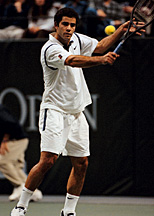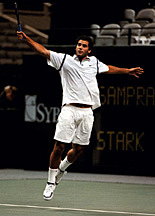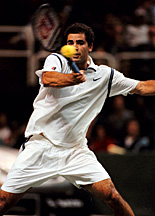Pete Sampras, The Rodney Dangerfield Of Tennis
by Joel Drucker
Pete Sampras is tennis’ Rodney Dangerfield. He just don’t get no respect. It
doesn’t matter that he’s won 11 Grand Slam titles -- or more explicitly, for the
sake of showing true brilliance, five Wimbledons, four U.S. Opens and two Australians. It
doesn’t matter that he’s been number one for six straight years, longer than
anyone in the sport’s history. It doesn’t matter that he’s played a vital
role on two winning U.S. Davis Cup teams, or that his on-court behavior is exemplary. Nor
does it matter that he plays a brand of tennis as versatile as any in history, wonderfully
blending power, feel, movement, and balance -- to the point where no less a practitioner
and harsh critic as John McEnroe has called him "beautiful."
 |
a wonderful blend
of power, feel, movement, and balance
But what does matter is when it comes to the dialogue around tennis these days,
where a certain crabbiness pervades the atmosphere. Tennis now is much like rock ‘n
roll in the ‘70s, an era when people lamented the passing of the Beatles and the
Doors, the decline of the Rolling Stones, and the death of Jimi Hendrix and Janis Joplin.
In recent years, tennis folk have been waxing nostalgically about the passing of bygone
days. Super Saturday ‘84 -- that great U.S. Open day when Lendl, Evert, Navratilova
and, finally, Connors and McEnroe, played epic matches -- is our Woodstock. Altamont
happened when Ivan Lendl ushered in a chilly, international, corporate flavor to the
sport. We’ve been on the ropes ever since. And Sampras? He’s Led Zeppelin, the
biggest band of an era when people are angry at tennis. Angry at it for losing its
popularity, angry at its players for growing more distant, angry at the sport for bringing
in more and more players from different countries -- and in the process, taking tennis
even further from the center of the American sporting scene. Only from his peers does
Sampras get respect. Even the grudgeful Connors has given him his due. Carrying the rock
analogy further, I recently talked with several music writers and asked how they kept the
candle burning while others heaped insults in the post-Beatles era. "Indeed, there
are many who prefer hanging out at funerals and thinking only of the past," said one.
"Those people aren’t very healthy."
 |
even the grudgeful Conners has given Sampras his due
Unfortunately, those who try to make the sport a success have inadvertently
conspired to the undercelebration of Sampras. Unsure of itself now that the halo of the
tennis boom has worn off, those in charge have thought it best to make tennis
"cool," to give it "buzz" and excite people about its
"personalities." This is why every time Andre Agassi makes a move, a feeling of
imminent salvation runs through the sport, a sense that if Agassi can win, tennis will be
saved for its sins. As likeable as Agassi is (he really is), this kind of commerce-driven
panting is enough to inspire a backlash. For the ATP and WTA Tours, it’s easier to
get a player on Jay Leno’s show once a year than it is to get many newspapers to
actually cover a tennis match. Not that Jay Leno is a bad venue; it’s just that once
you get people inside the tent you need to give them some meat -- and in that sense, the
sport lets itself down.
God forbid we should focus on the game itself and dig deep into the court rather than
scour the periphery. Which is sad, because this knowledge of the playing field is the
reason for the popularity of other sports. In other words, Sampras suffers because so many
people can’t accept tennis simply as a sport. John Elway -- we hardly really know
him, but even the most slothful fan can discuss rollouts and fourth-quarter comebacks. Cal
Ripken -- in no way a facile talk show guest, but everyone knows what it takes to play
baseball. And Michael Jordan? Well, none of those commercials would mean a thing if we
didn’t get excited about jump shots and slam dunks. Even when the home team wins big,
the reporter must cover the game -- and in the process, educate and service fans with
details about the way the sport is played. But Sampras, he suffers because so many who
watch, write, and talk about tennis aren’t willing to look closely at the action on
the court. If they did, they would see incredible brilliance.
 |
"if people knew how hard it was to play, maybe they
wouldn’t think I was boring."
"I’ve watched myself on tape," Sampras told me in a recent phone
interview, "and it looks so easy. But believe me, if people knew how hard it was to
play that well, maybe they wouldn’t think I was boring." For what is boredom but
an unwillingness to pursue interest? There are no boring subjects, a journalistic adage
goes, only bored writers. But what we have created in tennis is a lusting for offcourt
acts over oncourt skill, an insecure belief that it’s not worth plunging into the
nuances of the sport. Earlier in the decade, Sampras was considered just another part of
the so-called power game that was ruining the sport. Then, once he started winning big
titles, he was knocked for being too dominant. Funny -- I don’t recall NFL ratings
sinking when the Packers were dominating in the ‘60s.
Off the court, Sampras is as characteristically focused as any world-class athlete, as
prone as any to drift into lockerroom cliches. But heck, look no further than Joe DiMaggio
for a more insular persona. No one ever went to a Joe Montana interview expecting to find
personality. And yet, in many interviews, Sampras can be engaging, occasionally even
cheeky. But let’s face it: It’s pretty difficult to understand a sport if all
you do is hunt for quotes and watch talk shows. As seen, this article is as much about the
piss-poor marketing of tennis as it is about Sampras. What’s so sad, though, is to
see how much of his brilliance has been underappreciated. One argument goes that he
can’t lay claim to being the best ever if he doesn’t win the French Open. Well,
first, the history of the sport is filled with partially-incomplete resumes, from McEnroe
and Connors’ failures in Paris to Borg’s at the Open, Lendl at Wimbledon, etc.
But on a bigger picture note, surely we must consider Sampras one of the five best ever.
Hopefully, this recognition will come while he’s still playing rather than in the
final minutes of his career.
TennisOne is proud to introduce its newest contributor, Oakland-based Joel Drucker.
Joel has been involved in tennis for many years a a player and writer. He’s written
extensively about the game for such publications as Tennis Magazine, HBO Sports and
Biography Magazine. He also served as the technical editor on Patrick McEnroe’s book,
Tennis For Dummies. For TennisOne, Joel will be writing regularly about the pro tennis
circuit. |